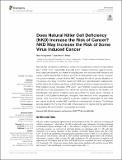Files in this item
Does natural killer cell deficiency (NKD) increase the risk of cancer? NKD may increase the risk of some virus induced cancer
Item metadata
| dc.contributor.author | Moon, Won Young | |
| dc.contributor.author | Powis, Simon J. | |
| dc.date.accessioned | 2019-07-23T12:30:03Z | |
| dc.date.available | 2019-07-23T12:30:03Z | |
| dc.date.issued | 2019-07-19 | |
| dc.identifier | 260273816 | |
| dc.identifier | 523dd958-b44e-4fdf-9457-4748bba1512c | |
| dc.identifier | 000476744500001 | |
| dc.identifier | 85071160646 | |
| dc.identifier.citation | Moon , W Y & Powis , S J 2019 , ' Does natural killer cell deficiency (NKD) increase the risk of cancer? NKD may increase the risk of some virus induced cancer ' , Frontiers in Immunology , vol. 10 , 1703 . https://doi.org/10.3389/fimmu.2019.01703 | en |
| dc.identifier.issn | 1664-3224 | |
| dc.identifier.other | Bibtex: urn:7b4da88c791ab0d0f1a23ccd2a283d80 | |
| dc.identifier.uri | https://hdl.handle.net/10023/18153 | |
| dc.description.abstract | Natural killer cell deficiency (NKD) is a primary immunodeficiency where the main defect lies in CD56+CD3− natural killer (NK) cells which mediate cytotoxicity against tumors. Most cases are observed in children and adolescents with recurrent viral infections and cancer. GATA2 and MCM4 mutations are found in NKD patients with cancer. However, the question remains unclear whether NKD increases the risk of cancer. Mutations in the second zinc finger of GATA2 cause both NKD and haematopoietic malignancies. MCM4 splice site mutations are found in NKD patients and they increase susceptibility to DNA instability during replication. IRF8, RTEL1, and FCGR3A mutations are associated with NKD but their associations with cancer are unknown. Based on the studies, it is hypothesized that genetic mutations alone are sufficient to cause cancer. However, a number of NKD patients developed oncogenic viral infections which progressed into cancer. Here, we review the evidence of genetic mutations responsible for both NKD and cancer to identify whether NKD contributes to development of cancer. The findings provide insights into the role of NK cells in the prevention of cancer and the significance of assessing NK cell functions in susceptible individuals. | |
| dc.format.extent | 5 | |
| dc.format.extent | 394817 | |
| dc.language.iso | eng | |
| dc.relation.ispartof | Frontiers in Immunology | en |
| dc.subject | NKD | en |
| dc.subject | NK cells | en |
| dc.subject | Oncogenic viral infections | en |
| dc.subject | CD56bright NK cells | en |
| dc.subject | MDS-AML | en |
| dc.subject | RC0254 Neoplasms. Tumors. Oncology (including Cancer) | en |
| dc.subject | QR180 Immunology | en |
| dc.subject | SDG 3 - Good Health and Well-being | en |
| dc.subject.lcc | RC0254 | en |
| dc.subject.lcc | QR180 | en |
| dc.title | Does natural killer cell deficiency (NKD) increase the risk of cancer? NKD may increase the risk of some virus induced cancer | en |
| dc.type | Journal item | en |
| dc.contributor.institution | University of St Andrews. School of Medicine | en |
| dc.contributor.institution | University of St Andrews. Centre for Biophotonics | en |
| dc.contributor.institution | University of St Andrews. Biomedical Sciences Research Complex | en |
| dc.contributor.institution | University of St Andrews. Cellular Medicine Division | en |
| dc.identifier.doi | https://doi.org/10.3389/fimmu.2019.01703 | |
| dc.description.status | Peer reviewed | en |
This item appears in the following Collection(s)
Items in the St Andrews Research Repository are protected by copyright, with all rights reserved, unless otherwise indicated.

